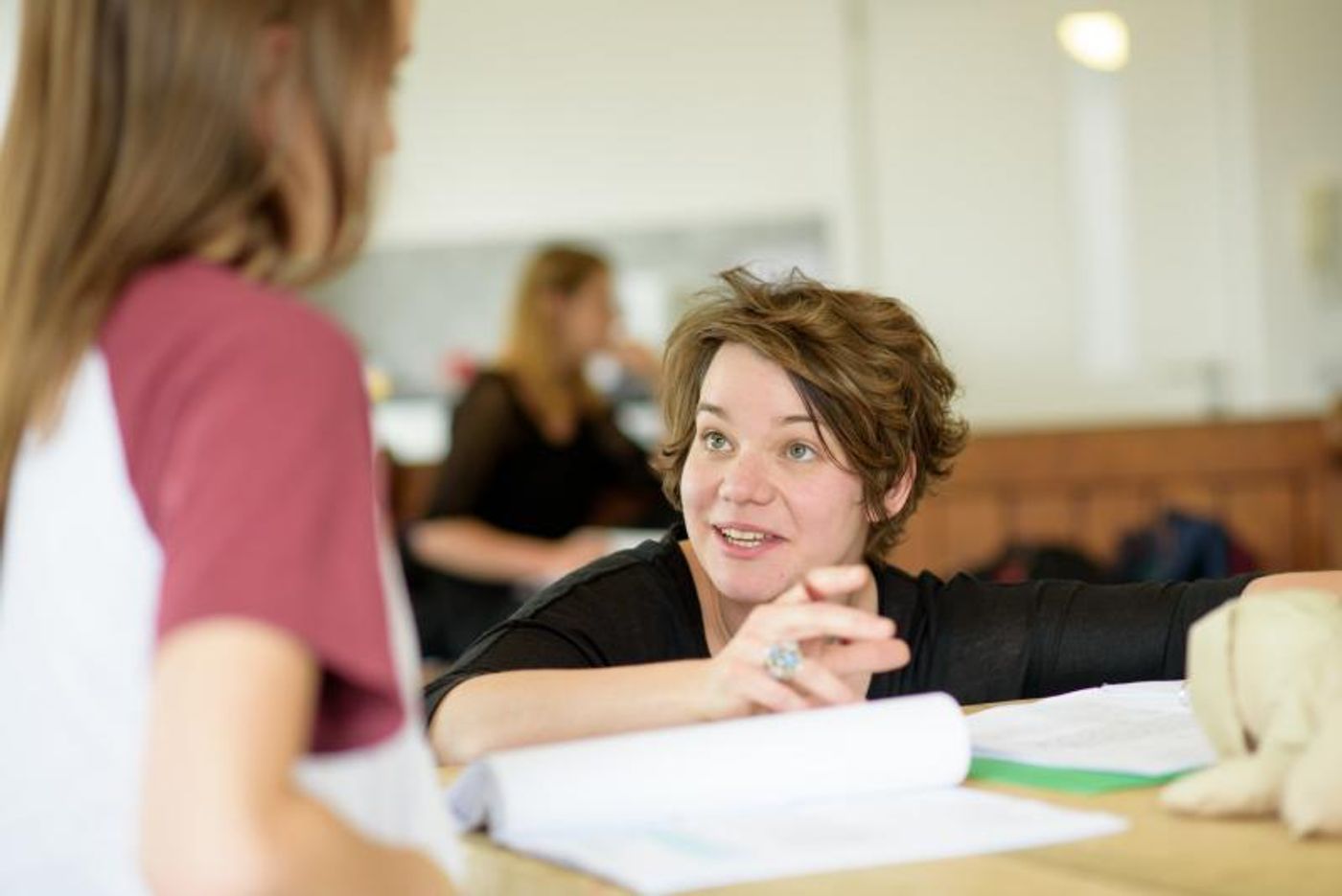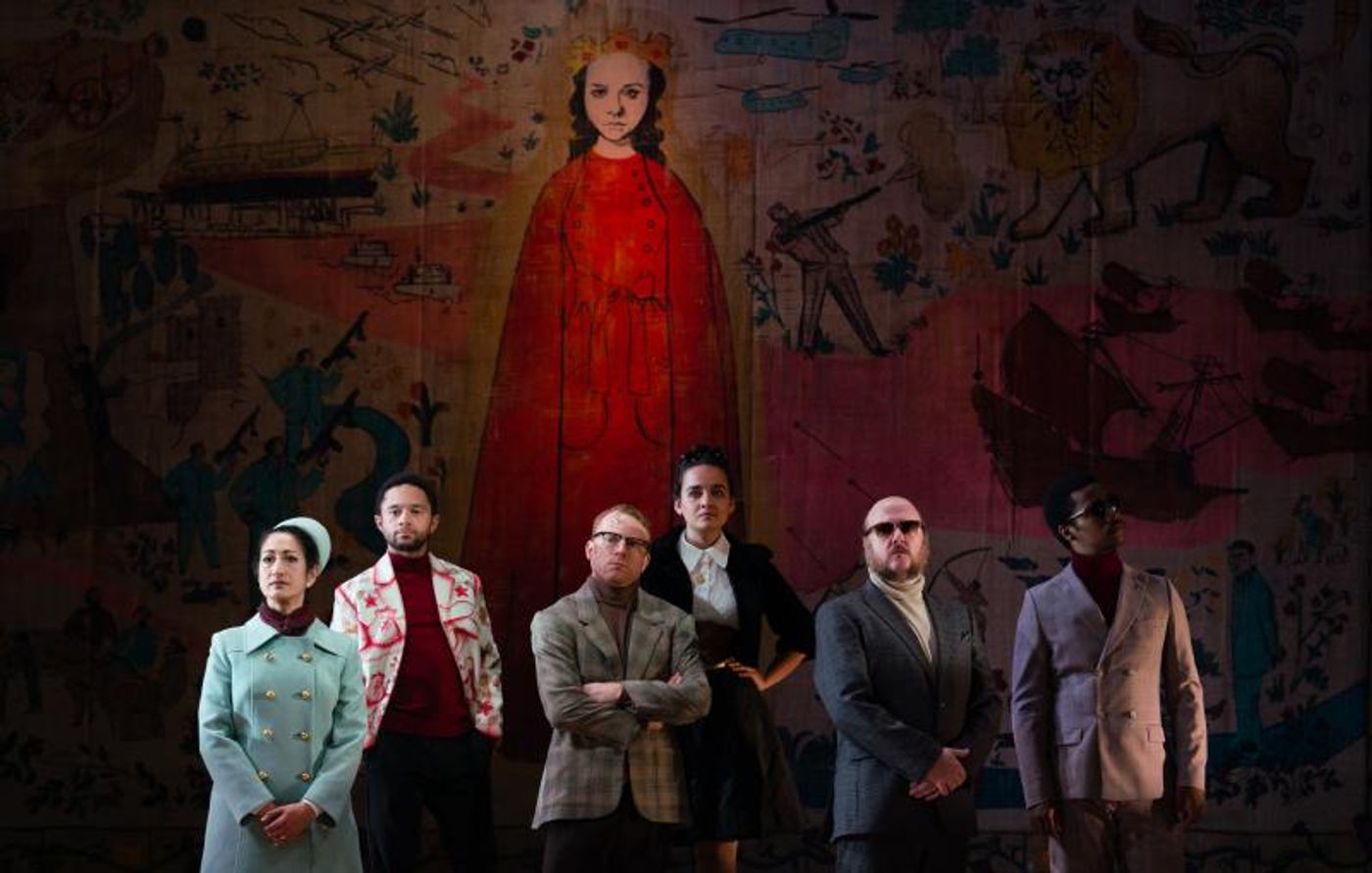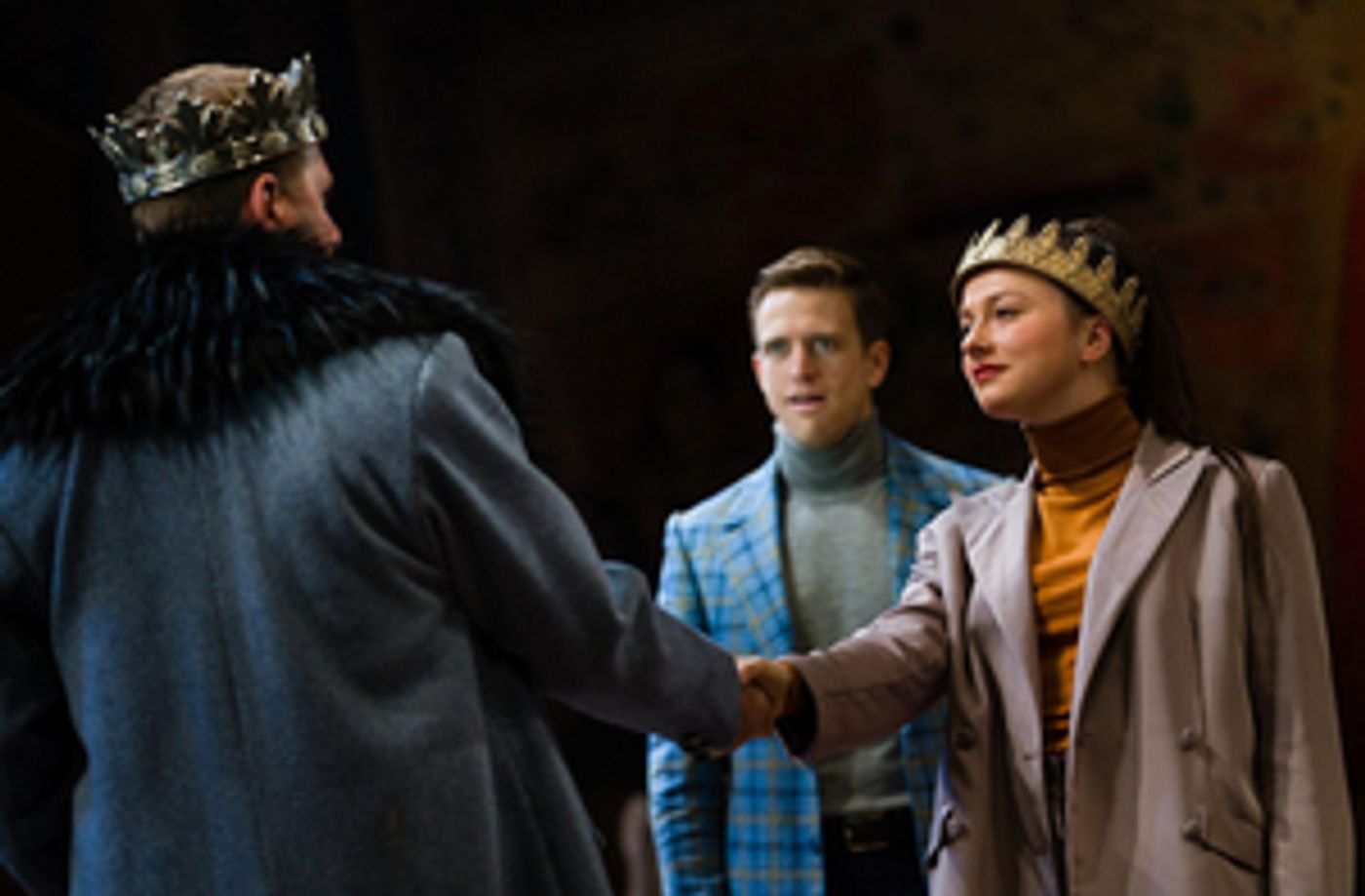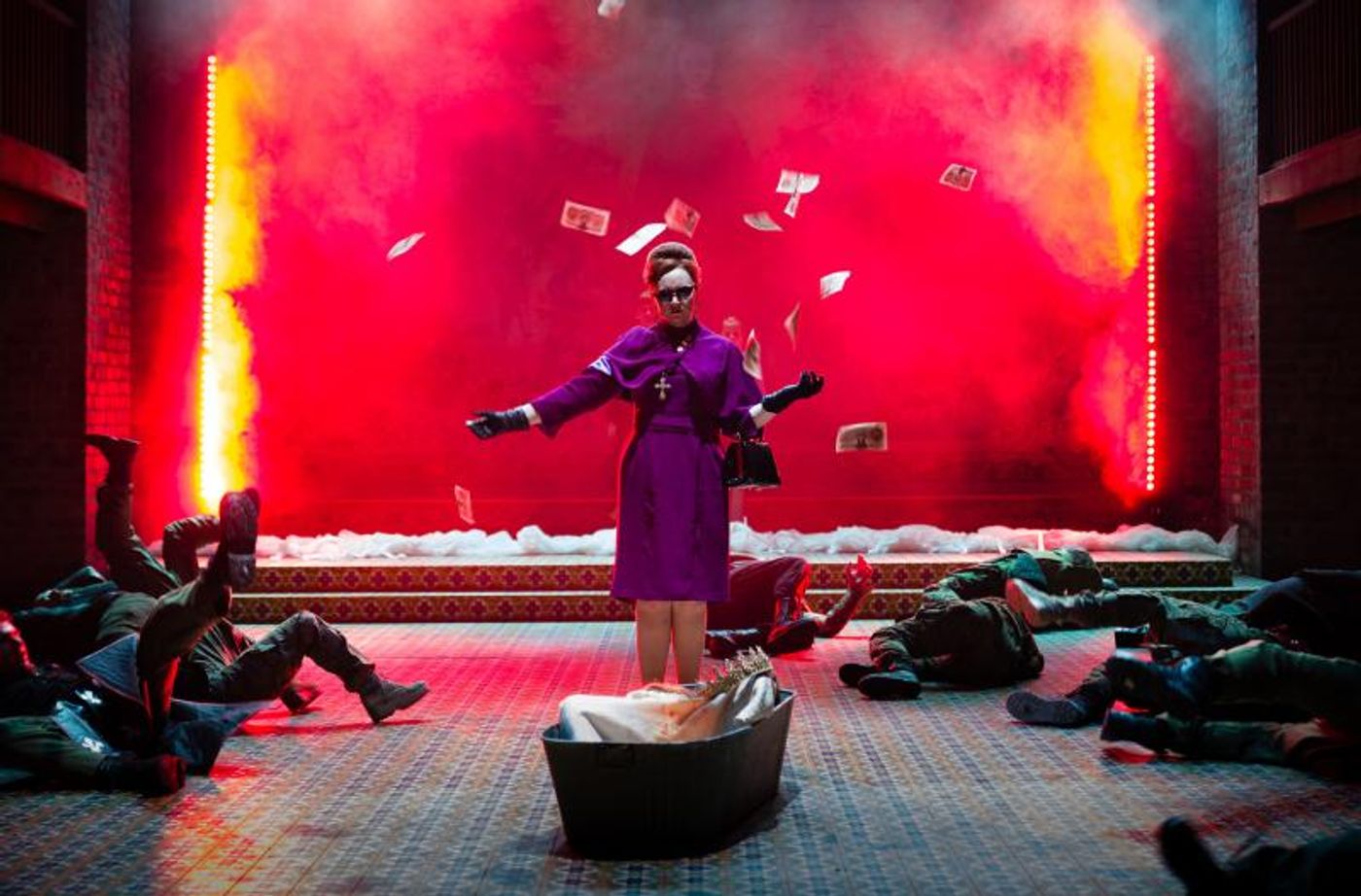Interview: Eleanor Rhode Talks KING JOHN

This Autumn, the Royal Shakespeare Company stages a story of a nation in turmoil: King John.
The timeliness of this play is not lost on the director or the company, with the news "informing [their] conversation pretty much every day as [they] make the show". Early into the run, Director Eleanor Rhode spoke to us about the resonance of the play today, as well as why and how she decided to stage the production in this way.
Thanks for chatting to us, during a busy first week of performances and your RSC directing debut!
Thanks. It's been great - quite an adventure so far!
It's so nice to get the show in front of audiences. We had a lovely crowd the other night. There were a lot of really young people and several groups of students. They were all buzzing in the interval, and at the end one of them came up and said thank you. I think it was their first time at the RSC, and for some of them it was possibly their first time with Shakespeare - so to see them completely caught up in everything was hugely exciting.
With King John you know that there will be a lot of people in that audience who won't know it, won't have read it and won't have seen it. So that feels really exciting - to give an audience a new-writing experience with a play that's 400 years old.
What was your first encounter with King John?
I knew little bits of the text - most people know more of it than they realise, but the language has crept into our consciousness somehow. I'd never seen a production, so when I read it for the first time, I wasn't really sure what to expect.
On first reading, what I was amazed by was just how funny it was and just how much the characters leap off the page. They're so visceral, so real, so absurd and it feels so modern. It's not a creaky historical document; it's a bold, brash, political satire. And we've very much grasped on to that with this production.
It moves at a lightning pace. And it swings fiercely between something that is absurdist and incredibly funny, to disturbing, and then into something that is spiritual and grief-stricken.
It's rooted in a really personal drama, but then it zooms back out into something that has a national context, all in the space of pages. It is a hefty piece of work, but it's rooted in the story of just one family.

Those family ties and using that to ground the story remind me of your approach with Boudica at the Globe, and telling her story.
It's something that interests me a lot. A lot of people my age were sucked into politics in the late 90's through The West Wing. Political dramas like that really worked because you invest in the characters: these are interesting people who believe in something that is real and tangible and important to them, and so you also invest in the issues.
We should all have a stake in the game, we should all be invested and involved because these are all things which affect our daily lives. But I still think that there's this notion that politics is not for everyone, and so a lot of people disengage.
What Shakespeare has done in this text is to say: "I'm going to show you a room that you would never normally have access to and my God, you're going to be surprised by how everyone talks to each other!" These are the people in power, but they're no more intelligent or capable or noble than anyone else.
Not too dissimilar to our own political climate today...
Last year I was researching a production that involved me going into the House of Commons and interviewing a lot of MPs. Everyone was very forthcoming and welcoming. I'd always held Westminster up as this amazing, enduring institution. Yes, it's ridiculous in a lot of ways and exclusive and needs reforming, but ultimately it's something where Government functions and the important business of the day happens.
But you quickly realise that it's no different to any other large organisation - no-one really knows what they're doing, they're all fallible, they're all having to make things up as they go along and hope for the best. Which is kind of a relief - they're all human, after all... but also really, really terrifying!
Shakespeare shows that brilliantly in this play - how leaders are imperfect humans. Power doesn't elevate a person. It's all about expediency, it's not about morality or some enduring truth. Kings are not special, leaders are not special, they happen to be there and they need to do their job. But you should question what they're doing if you don't agree with them.
And the resonance with today and current constitutional issues is so powerful, for the audience and actors. During the business with the Supreme Court ruling I had the actors running into rehearsals going, "Oh my God! Have you seen the news?! Now suddenly this speech that I say has extra resonance and makes so much sense to me".
The news is informing our conversation pretty much every day as we make the show.

and Brian Martin in King John
Rosie Sheehy and Katherine Pearce play roles traditionally played by men. Did you consciously decide to follow non-traditional casting, when approaching the production?
This might sound really weird: it didn't feel like a big deal for me.
I didn't go into casting the production thinking that this specific role had to be played by a woman, even though they're traditionally played by a man. And we've ended up with two actors Rosie Sheehy and Katherine who are playing John and Pandulph, who are traditionally played by men. And neither of them play them as men, and that was the conversation that really interested me in early meetings I had with both of them.
I wasn't making a comment on gender politics; there is no real gender politics in the play. There are very strong, traditionally female roles in it as well. The point was that I was excited by these two actors first and foremost.
So we don't change any pronouns. Katherine is wearing a dress and amazing heels throughout, but she's definitely the Cardinal.
And the same with their accents, we don't cover those. Katherine is from Manchester, Rosie is from Port Talbot and I wanted them to keep their voices, their own accents and their own personalities - not to try and play these male characters 'as men' but to find their own interpretation and nuance in the text.
And to hear them use this powerful language is really exciting. It feels different hearing them say it compared to hearing a middle aged man with an RP accent saying it. You listen to the authority of the text in a very different way when it's spoken by a young Welsh woman. I think we all still succumb to certain stereotypes as to what authority looks like, what power looks like. And so it's been really interesting to question that.
And how have audiences reacted to that?
I think most of the audiences who come have a little shock when they see Rosie for the first time. But I think that's because the first time we see her as John, he's nursing an awful hangover and listening to 1960s pop music in a crown and dressing gown. As soon as Rosie starts talking, you don't question the fact that she's a King. She's captivating.

in King John
And on accents, you've encouraged everyone in that room to speak in their own accent.
Absolutely. We have: a Scottish actor playing the Bastard, who's incredible and the verse works beautifully in Glaswegian; we have quite a few actors from Manchester; the Dauphin is from Dublin; Rosie's from Wales... We've also actors from Egypt and Iraq in the company, which is really exciting.
We started this chat by talking about students' first time experiencing Shakespeare with this production. To round off, can you share what your first time at the RSC was with Shakespeare?
I think it was in the old RST theatre when it was still a proscenium theatre and I was about nine years old.
We went on a school trip to see Henry V. And the following day we went on a backstage tour and there was still stage blood on the stage, and I was amazed by how sticky it was under my feet. That's still a problem we have on this production - it's a nightmare to clean all the blood off the floor.
King John at the Swan Theatre, Stratford-upon-Avon until 21 March.
Photo credit: Steve Tanner
Videos

